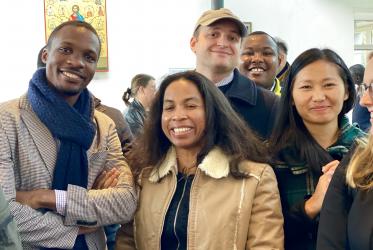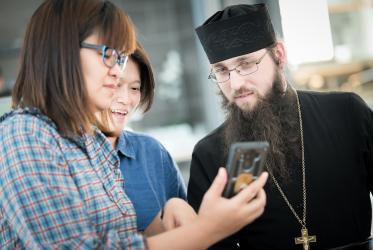Time for reflection after my visit to Egypt. The story has etched itself into my memory. I can’t leave it behind. It comes to me every day like a constant reminder of the fragility of life, of our mortality, of the courage and faith of our fellow humans that carries us in our darkest and most despondent hours.
The words that are always with me are, “We meet at home before Sunday service to pray for the fellowship at the service, for our safety, to be able to return home in one piece after the service. We usually say farewell to each other in our homes in case we don’t make it back. Because that’s a possibility. We know that we’re a target for extremists. We know that we’ll be targeted again. We know that our faith is seen as a provocation. We know that we’re risking our lives for our faith. But we want to be able to practise our faith together. We know that love conquers the forces of evil. And one day, it will. The greatest of all things is love.”
I remember the words like it was yesterday. It’s a couple of weeks since I heard them during my visit to the member churches in Egypt. I’ve heard about similar situations, read about them.
There are many people who are persecuted for their faith. Plenty of reports exist. But they’re abstract, difficult to take in. But the words and stories got to me this time. I feel the despair of anger.
My heart is crying. I feel helpless. I wish that I could have the same courage as the Copts, feel the same boundless love for my fellow people. They only give love.
The motto of Pope Tawadros is “Love never ends”. They demonstrate their faith in words and actions. They believe in martyrdom. See the article with Bishop Thomas published in April.
I remember the meeting in St. Peter and St. Paul's Church, a chapel beside the big St. Mark's Coptic Orthodox Cathedral, which was the site of a terrorist act in the middle of a church service on 11 December 2016. Twenty-nine people were killed, of which 28 were women, and over 50 people were injured.
We visit the church, which is stunningly beautiful and peaceful with its paintings depicting biblical scenes. A damaged pillar shows where the bomb was detonated, in a section where women and children were sitting together. A door and a window show clear traces of the atrocity.
The parish repaired the church in just a few months. They love their church. Out in the churchyard, they have created a shrine to the dead.
I look at the photographs. So many lives with stories to tell. I see a picture of an extremely beautiful and happy five-year-old who is smiling at the camera. Five years old and killed in church, in the middle of a service. A life that had just begun, extinguished by this act of madness. Words fail me.
I admire the courage of the Christians and their way of dealing with it. I light a candle and pray for peace. Watch the cats playing undisturbed in the churchyard. They look at this stranger for a while. I dry my tears and walk on.
Outside the church are armed guards. Unheard of for me, but daily life for others. A few days later Pope Francis, Pope Tawadros, Patriarch Bartholomew of Constantinople and many church leaders come together to pray for peace and reconciliation in the beautiful little church.
Two weeks later, I take some time to reflect on my experiences. I admire the unswerving faith of the Copts that carries them along, giving them guidance and love.
I particularly recall the visionary discussion between the leadership of the World Council of Churches and Patriarch Theodore II of Alexandria, which showed the clear leadership that is in place and the strong faith in building for the future and working to achieve interreligious dialogue.
One of the plans is to create a forum for young people in Egypt, to invite young people from other countries to an consultation and to focus on education. I remember the conversations with the Grand Imam of Al-Azhar, who wants the same things: dialogue, collaboration and education. A strong beacon of hope is emerging from the darkness of hopelessness and, as Pope Tawadros said, “love never ends.”
God of Life, lead us to justice and peace.




